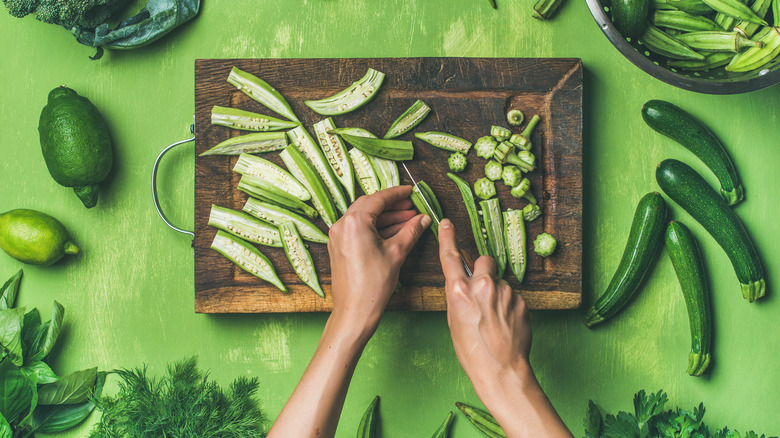The Okra Cutting Trick That Eliminates Sliminess
Naturally, some folks may not want to eliminate okra's sticky substances. After all, that property is what makes okra so perfect as a thickener for recipes such as soup, where it binds oil and water together. Indeed, gelatinous "mucilage" — as it's scientifically known — is valuable even outside of the kitchen. Numerous different plants contain mucilage, and because it's biodegradable, colorless, non-toxic, odorless, and tasteless, it can be utilized in agriculture, cosmetics, and pharmaceuticals, too. Among culinary circles, it can also be used to coat fresh produce and make it last longer.
Whether you're looking to keep or get rid of the sliminess, though, just know that you'll find it inside of okra's pods. The soluble fibers there consist of sugars and proteins that dissolve in water and become even slimier when exposed to heat. Knowing this enables chefs to slice the stuff out if desired, and thankfully it's an easy fix home cooks can do as well.
Cut okra lengthwise to release its slime
Here's what you really want to do: Cut the okra into strips, not rounded slices. More specifically, cut okra like an onion — with the top kept on so that it holds the strips and prevents any mess. Carefully make your incisions lengthwise toward the cap, rotate the okra about a fourth of the way, and repeat. Once you've finished a full turn, you're ready to chop off the top and let all the goo ooze out (via Food & Wine). Lastly, after washing off your sticky knife and cutting board, cook the okra however you see fit.
Chopping okra and piercing its pods releases the veggie's slime, but because this substance is sticky, it's not always a clean break. So, even chopped okra can end up slimy once cooked in water. Some cooking styles result in more sludge than others, though. High heat for a short time leads to less slime, so fried okra and sautéed okra are your best bets. Adding acid (like lemon juice) to the dish can similarly reduce its sliminess. So, luckily, there is a fix available even if you don't cut or cook right.
Alternatively, you can soak okra in vinegar to break down the mucilage prior to cooking it. No wonder folks pickle okra! Additionally, you can leave the okra out to dry or leave it uncooked, but where's the fun in that? Besides, we want to eliminate slime, not simply make it less pronounced.

